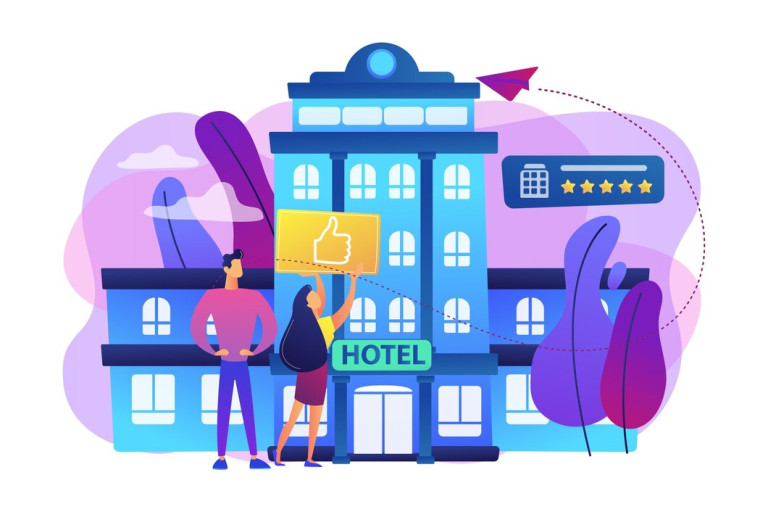Understanding and controlling hotel costs is an integral part of maintaining financial stability, optimizing profits and ensuring service quality. To do this, you need to implement effective cost control strategies, combined with the use of technology and detailed reporting.
This article by Bizzi will provide important information and methods for understanding and controlling hotel costs.
What is the hotel cost?
Concept
Hotel costs are the daily expenses incurred to maintain hotel operations – serving guests, maintaining facilities, operating services, personnel, etc.
Specific examples of hotel costs:
- Receptionist, housekeeping, maintenance, kitchen staff salaries
- Cost of electricity, water, internet, laundry, cleaning chemicals
- Food and beverage (F&B) costs
- Maintenance costs for air conditioning, lighting systems, fire protection
- Consumables: towels, soap, mineral water…

The Importance of Controlling Operating Costs.
Controlling operating costs is not just about cutting, but optimizing – reallocating spending to achieve the highest efficiency. Hotel operating costs will directly affect many aspects of the business:
-
- Profit: Operating costs account for the largest proportion of total hotel costs (40–70% depending on the type). Therefore, good control of hotel costs will help increase EBITDA (earnings before interest, taxes, depreciation and amortization) without increasing selling prices.
- Improve cash flow and solvency: Stable cash flow helps hotels always have enough money to pay salaries, maintain and buy essential supplies.
- Increase flexibility in market fluctuations: When room capacity decreases (due to low season, epidemics, etc.), hotels can flexible cost reduction If there is a tight control system. Reduce the risk of capital loss and insolvency.
-
- Maintain stable service quality: Helps allocate budgets appropriately to departments while still ensuring customer experience.
- Optimize operating performance: Timely detect which department is using the budget inefficiently, which process is wasting labor and materials. From there, it is possible to restructure personnel, adjust work processes, and increase productivity.
- Support accurate financial decision making: With detailed cost data, investors can plan realistic budgets, make investment decisions, expand, and price rooms appropriately.
Distinguish between Hotel Costs and other types of costs.
| Cost Type | Nature |
| Operating costs | Repeat regularly, serve customers directly |
| Cost of capital | Direct input costs of products sold |
| Financial costs | Loans, interest rates |
| Investment costs | Purchase of fixed assets, long-term upgrades |
Classification of hotel operating costs
Clearly classifying these costs helps hotels easily monitor, control and optimize hotel costs, thereby improving operational efficiency and profits.
- Direct Costs: Are costs directly related to customer service activities.
For example: Food and beverage (F&B) costs: Food ingredients, drinks served in restaurants, minibars; Room costs: Labor costs, materials for cleaning rooms, beds, wardrobes, bed linens.
- Indirect Costs: Are costs not directly related to providing services to guests, but support hotel operations.
For example: Management costs – Salaries of hotel management levels (directors, department heads); Office stationery and paperwork costs: Office supplies and equipment.
- Fixed Costs: These are costs that do not change with the level of hotel activity and must be paid even when the hotel has no guests.
For example: Rent, Fixed employee salaries, Employees' salaries do not change, even during low season.
- Variable Costs: This is a cost that varies with the level of activity of the hotel. As the number of guests and revenue increases, this cost will also increase.
For example: Food ingredient costs: Increase according to the number of customers dining at the restaurant; Laundry costs; Electricity, water, gas costs consumed during the process of serving customers.

- Departmental Costs: This cost is allocated to departments within the hotel for easy control and analysis of each department's performance.
For example: Room costs, Cost of food and beverage ingredients, service staff salaries; Service costs related to additional services such as spa, gym, swimming pool.
- Special Operating Costs: Are costs that arise in special or irregular situations.
For example: Unexpected repair costs (electrical systems, fire protection systems); Seasonal costs during peak seasons (overtime wages, promotions).
- Marketing & Advertising Costs: Are the costs incurred in promoting the brand and attracting customers.
For example: Online advertising, fees paid to online booking channels such as Booking, Agoda.
How to control hotel costs?
This is a question that many managers ask, especially in the context of the current economic crisis. Controlling costs in hotels is a key factor to maintain stable profits, especially in a low-margin and highly seasonal industry like hospitality.
Analyze and understand the Types of Costs
- Fixed costs: Employee salaries, insurance, rent.
- Variable costs: Electricity, water, food ingredients, laundry.
- Direct costs: Costs for each department such as housekeeping, F&B, spa.
- Indirect costs: Management, marketing, office supplies.
There are also other types of costs as analyzed above.
Build a detailed budget and plan
- Cost Forecasting: Plan spending for departments such as rooms, F&B, marketing.
Calculate the cost per unit of service product (e.g. cost per room/minute, cost per meal). - Allocate costs wisely: Minimize waste by clearly assigning costs to each activity.
Conduct periodic inspections and monitoring
- Inventory control: Ensure that no supplies are damaged or lost.
- Check food costs: Make sure food ingredients are used efficiently and there is no waste.
- Check invoices and receipts: Make sure all invoices and receipts are accurate and reasonable.

Negotiate and find good price suppliers
- Negotiate costs with suppliers: Look for partners who provide raw materials and services at reasonable prices or with preferential policies.
- Negotiate OTA commissions: If you use online booking channels (OTAs), negotiate a lower commission or choose a lower cost channel.
Training and practice of cost management for employees
Hotel operating costs can be reduced if staff are properly trained in how to manage resources, avoid waste and save costs.
- Receptionist training: Manage guest schedules, avoid overbooking but also avoid overloading and causing losses.
- F&B staff training: Managing ingredients, avoiding food and beverage waste.
Maintenance Staff Training: Equipment maintenance guidelines to reduce repair costs.
Reduce waste and optimize resource use
- Reduce energy consumption: Install energy-saving lighting systems and control room temperature appropriately.
- Optimize staff: Adjust staff schedules to match the number of customers, avoiding unnecessary increases in staff costs.
Review and restructure unnecessary operations
- If your hotel is having trouble controlling costs, consider restructuring or eliminating unprofitable activities or services. This will help reduce unnecessary costs and focus on profitable activities.
Indicators for evaluating the efficiency of hotel operating costs
To evaluate the effectiveness of hotel operating costs, financial and operational indicators are very important. They help measure and analyze the use of resources in the hotel, thereby making more optimal decisions for cost control and profit growth.
Below are the indicators to evaluate the efficiency of operating costs in hotels:
- RevPAR (Revenue per Available Room): Dmeasure revenue The average number of rooms available in a hotel, regardless of whether they are sold or not. This metric helps evaluate the efficiency of room utilization and maximize revenue from available rooms.
Recipe: RevPAR = Total Room Revenue / Number of Available Rooms
- GOPPAR (Gross Operating Profit per Available Room): Measures gross operating profit per available room. This is an important indicator to evaluate the cost efficiency and profitability of hotel operations, including operating costs.
Recipe: GOPPAR = Gross Operating Profit / Number of Available Rooms
- TRevPAR (Total Revenue per Available Room): Do measures total revenue per available room, including all revenue from rooms, food, beverage, spa, events, and other services. This is a more comprehensive metric than RevPAR and helps evaluate the overall performance of a hotel.
Recipe: TRevPAR = Total Revenue / Number of Available Rooms
- ROI (Return on Investment): Measure the effectiveness of investments in facilities, service improvements or any hotel expansion projects.
Recipe: ROI = Return on Investment / Investment

Questions to ask when cutting hotel operating costs
The decision to cut hotel operating costs cannot be made immediately, but must go through a process of assessing the current situation to make a decision. Before making a decision, leaders and managers need to consider many aspects, below are some important questions:
- Does this cost cutting affect service quality?
Can cost cutting affect the customer experience, especially in core services such as rooms, food and beverage, and customer service? Poor service can lead to a decline in hotel reviews and reputation, which directly affects revenue and profits.
- What costs cannot be cut without sacrificing operational stability?
Some costs, such as rent and key staff salaries, are necessary to keep a hotel running. Cutting these costs can be seriously disruptive.
- Which costs can be optimized instead of cut?
For example, is it possible to save energy, water, or reduce waste without affecting service quality? Rather than cutting costs directly, optimizing operations can deliver long-term benefits without harming customers or service quality.
- What costs can be reduced without affecting the customer experience?
Ancillary costs such as marketing, advertising, or non-essential services can be cut or redirected without directly affecting the customer experience, thereby optimizing operating costs while maintaining customer satisfaction.
- Can cost cutting affect staff?
Layoffs or reductions in benefits can damage the work environment and cause disruption to operations. Employees are a valuable asset to a hotel, and cost cutting can impact morale, leading to reduced service quality and productivity.
- Is it possible to reduce costs without compromising maintenance and repair?
Neglecting maintenance can lead to damage to equipment and facilities, disrupting operations and increasing future repair costs.
- Can supplier agreements be renegotiated to reduce costs?
Consider negotiating with suppliers that can help reduce costs without compromising quality, especially in areas such as food, hotel supplies, and outside services.
- What operational costs can be automated to save time and money?
Automating processes can help reduce labor costs and increase efficiency, such as in managing reservations, payments, or automated hotel services.
- Does cost cutting affect the hotel's long-term strategy?
Cost cutting can bring short-term benefits, but if done excessively, it can affect the hotel's long-term goals and growth strategy.
- Is it possible to reduce costs without reducing innovation and creativity in service?
Innovation is vital to staying competitive in hotels. If you cut back too much, you may lose the ability to develop new services that attract customers.
Overall, the above questions will help you gain a comprehensive view when controlling hotel costs as well as making decisions to cut hotel operating costs. It is important to consider and evaluate the impacts of cost cutting on service quality, employee performance, long-term strategy and customer satisfaction. Cost cutting must be accompanied by effective alternatives and not affect the reputation and sustainable operation of the hotel.
Applying cost control support tools for businesses
Bizzi Expense Providing comprehensive solutions to control business expenses in general and in hotels in particular, including:
- Automate invoice collection, expense approval, and budget tracking.
- The system helps track costs in real time and provides visual reports.
- Control room, F&B, maintenance, and other service costs, and provide detailed reports to optimize finances.
- Supports budget planning and alerts when costs exceed limits, helping to improve management efficiency.
Depending on the size of the business, the Bizzi team can redesign features to suit the needs and solve problems that the business is facing during operations.
- Integrating all functions on one intuitive interface, managers can easily monitor, reconcile and manage organizational costs in real time.
- Easily approve anywhere, anytime.
- Good budget control according to spending regulations. Automatic warning system when spending exceeds

Conclude
Effective and reasonable control of hotel costs not only saves money, but also brings many long-term values to the business, from profit, operation to customer experience. The benefit of optimal management of operating costs, hotels is increased competitiveness, optimization of internal resources. For hotels - where seasonality is high and fixed costs are high - this determines survival, profit and long-term growth.
Contact Bizzi now to own a modern finance department solution, automating revenue and expenditure operations for your business!
Link to register for a trial of Bizzi products: https://bizzi.vn/dang-ky-dung-thu/

